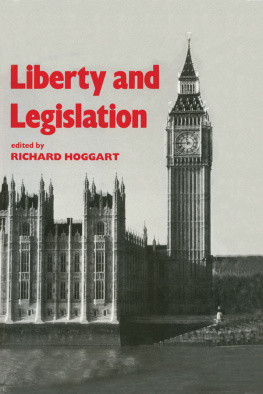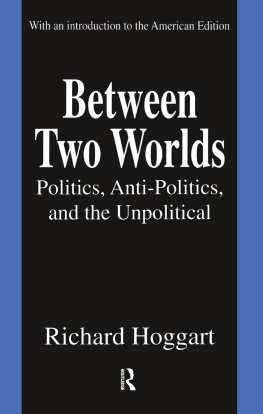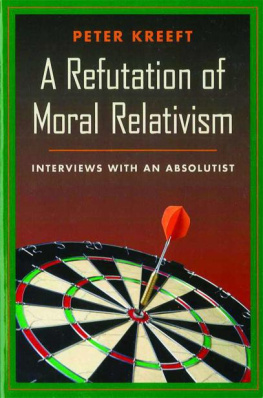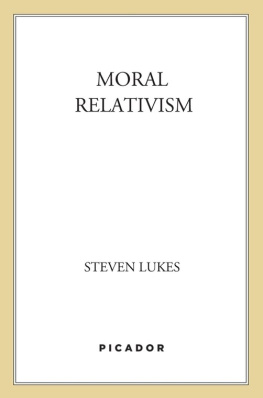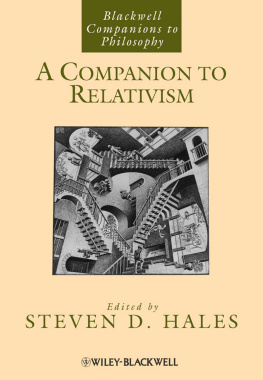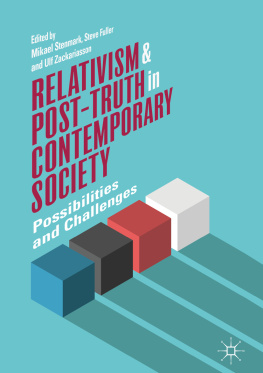First published 1998 by Transaction Publishers
Published 2019 by Routledge
2 Park Square, Milton Park, Abingdon, Oxon OX14 4RN
52 Vanderbilt Avenue, New York, NY 10017
Routledge is an imprint of the Taylor & Francis Group, an informa business
New material this edition copyright 1998 by Taylor & Francis
Copyright 1995 by Richard Hoggart
All rights reserved. No part of this book may be reprinted or reproduced or utilised in any form or by any electronic, mechanical, or other means, now known or hereafter invented, including photocopying and recording, or in any information storage or retrieval system, without permission in writing from the publishers.
Notice:
Product or corporate names may be trademarks or registered trademarks, and are used only for identification and explanation without intent to infringe.
Library of Congress Catalog Number: 97-2268
Library of Congress Cataloging-in-Publication Data
Hoggart, Richard, 1918
[Way we live now]
The tyranny of relativism : culture and politics in contemporary English society / Richard Hoggart, with a new introduction by the author.
p. cm.
Originally published : The way we live now. London : Chatto & Windus, 1995.
Includes index.
ISBN 1-56000-953-5 (paper : alk. paper)
1. Great BritainCivilization20th century. 2. Great Britain-Politics and govemment1979 3. ConservatismGreat BritainHistory20th century. 4. Conservative Party (Great Britain) 5. Ethical relativism. I. Title.
DA589.4.H64 1997
941.085dc21 97-2268
CIP
ISBN 13: 978-1-138-53918-l (hbk)
ISBN 13: 978-1-56000-953-5 (pbk)
To our grandchildren,
with love
Coals to Newcastle! Why publish a book of English social criticism in the United States? Americans are the masters of that genre, of books excoriating the failings of their own educational system, the sleaziness of their broadcasting, their commercial exploitation of the arts, their despoliation of language, their whole egregious mass culture at its extremesall of which the British enjoy reading about.
The practice recalls Mary McCarthys remark, quoted in these pages, that American social criticism performs the function of the mirror in the whorehouse ceiling, You do it and you watch yourself doing it. This was in rebuttal of a distinguished American sociologist who had just remarked, for all our faults, we are the most self-critical nation on earth.
Both speakers are right, which is why the English read American social criticism so avidly. It is one of the more intriguing examples of both the good and the ill of commercial democratic systems, a system we share with you but dont handle, or expose, so openly. We see in those books from America the way we too are going, and are alternatively fascinated and appalled.
At the same time the British themselves are not all pleased by home-grown critics. This book was generally well-received in its native land. That was encouraging. But the few antagonistic reviews were more revealing. Their authors itched and scratched as though they were trying to get a very unwelcome incubus off their backs. The nadir was reachedthis about a book which even its author, with all due modesty, finds funny from time to timethat it may be that Hoggart lacks a sense of humor and so cannot appreciate the phenomena of mass culture. In Britain today that would be called a post-modernist judgment, the phrase which is always dragged into service about the fashionable bundle of attitudes that fears any sort of value judgment and comparison.
Happily, the English tradition in social analysis is much less shallow than that. It is indeed a long and honorable tradition stretching from, to go no further back, Coleridge and Wordsworth, both of whom made penetrating and memorable judgments on the human costs of industri-alization: Men, I think, are to be weighed, not counted. Then through John Stuart Mill, on the importance of thought coloured by feeling, the very culture of the feelings, and Matthew Arnold; his flawed and self-indulgent Culture and Anarchy is still riveting and pertinent reading. Then up to and through E. M. Forster, D. H. Lawrence and George Orwell. And even the naturalized mid-Westerner, T. S. Eliot.
That English tradition is above all close to the ground, rooted in quotidian experience, concrete, phenomenological. It runs its hands along the grain of experience, finds an arresting, encapsulating phrase and says: Look, isnt this curiousand telling? The French (and the German) traditions are, by contrast, fundamentally theoretic, and intellectually exciting in their own ways. It is to the great credit of the French that a number of their sociologists have now, without denying their own approach, said it is time to learn something from the practice across that narrow stretch of water.
Thoughts such as these surface when one thinks of ones own writing being published in that much larger and more self-aware society which has so much explored the genre. What, other than a footnote, can an English book add to the American examinations?
We sort of share a language and still sort of share something of the Anglo-Saxon tradition. But at their most interesting books of this kind from America tend to mix the mainland European and the British approaches, reaching after encompassing theoretic models yet also keeping close to the felt daily experience.
Moreover, the entire developed (what a question-begging epithet that is) world is subject to the tyranny of relativism as it is looked at in this book. Our representative, resonating, phenomena are different, but the main impulses behind the huge changes are much the same in all these nations: the decline of authority (yes, good to a democrat but not without its costs and demands); the immense increase in productivity of all kinds; greater and more widespread prosperity; the almost incredible development of communications technologies. All these create the commodity-driven societies, whether those commodities are clothing or cars or cultural attitudes or passing notions.
They create on No can ate a vacuum. If various forms of authority dissolve, then something else will rush in to take their place. In face of the range of developments listed above what rushes in is relativism, the sense that no one thing, no one object or idea, is better than another.
Yet even there, there can be no rest. The sense of the perspectives of history, of the lessons which might have been learned from them, also dissolves. So how are choices made? By cash, first and most crudely. By head-counting more seriously: If x million people buy it, view it with pleasure, hold this or that opinion, then such things must be right. That is democracy. No, it is democracy subverted into populism (in the pejorative English sense).
Of course life is not as simple as that. There are always checks and balances. In Britain there is still and in spite of much evidence to the contrary, a fairly strong sense of family, and of neighborliness (what Orwell called the sense of being, after all, a sort of family). There is also inertia which saves most of us anywhere from being steam-rollered into some sillinessinertia as friction, the cow unwilling to turn over in the straw. But doing so suddenly from time to time and surprising itself by its own social inventiveness, as when we started public libraries a century and a half ago, and allotments, and public service broadcasting and the Open University. Most important of all is the spirit of bloody-mindedness, also known as taking the mickey (or the piss), ribald subversiveness, spotting the con. America will have its own list.


